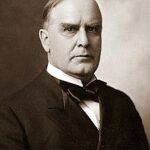McKinley’s Strategic Vision
President William McKinley faced a critical moment in 1899. European powers were carving China into spheres of influence. Britain, France, Germany, and Russia threatened to partition the ancient empire. McKinley recognized America needed a bold response to protect its commercial interests. 📊 US trade with China had grown from $4 million in 1880 to over $24 million by 1899.
The Open Door Policy Framework
Secretary of State John Hay crafted the Open Door Policy under McKinley’s direction. The policy demanded equal trading rights for all nations in China. It opposed territorial partition while respecting Chinese sovereignty. Hay sent diplomatic notes to European powers outlining American principles. 💰 The policy protected $15 million in annual US-China commerce without military intervention.
Diplomatic Innovation
McKinley’s Open Door Policy represented innovative diplomacy. It used moral authority rather than military force. The policy appealed to international fairness and free trade principles. European powers reluctantly accepted American leadership on Chinese affairs. This marked America’s emergence as a Pacific power.
Impact:
Immediate Global Consequences
The Open Door Policy transformed international relations in East Asia. European powers grudgingly accepted American diplomatic leadership. 🌍 Britain publicly endorsed the policy, strengthening Anglo-American cooperation. Germany and Russia offered qualified support despite their territorial ambitions. The policy prevented immediate Chinese partition and preserved nominal Chinese independence.
Economic and Commercial Benefits
American businesses gained unprecedented access to Chinese markets. 💰 US exports to China increased by 40% between 1900-1910. Standard Oil, American Tobacco Company, and other corporations expanded operations. The policy protected American missionary activities and educational institutions. Chinese students began studying in American universities in greater numbers.
Long-term Strategic Impact
McKinley’s Open Door Policy established America as an Asian power. It created precedent for multilateral diplomacy and collective action. The policy influenced Wilson’s Fourteen Points and post-WWI settlements. 🔥 However, it also contributed to tensions with Japan over Chinese influence. The policy remained cornerstone of US-China relations until 1949, shaping decades of Pacific diplomacy and American foreign policy doctrine.
